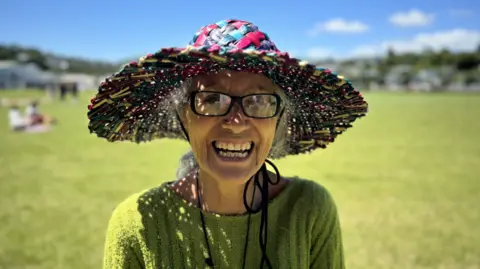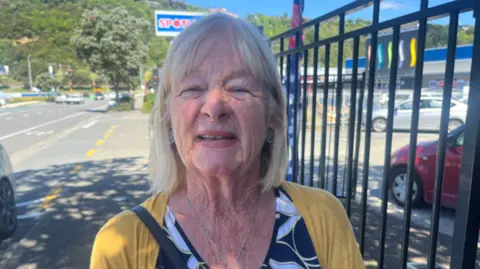Māori protested when hikoi arrived in Wellington

 Getty Images
Getty ImagesThousands of people are gathering for the final steps in a march on New Zealand’s parliament to protest a controversial bill to amend the country’s founding document between British colonialists and the Maori people.
Hotels in the capital Wellington were sold out – up to 30,000 people were expected to attend Tuesday’s protest outside parliament.
The protest marked the end of a nine-day peaceful protest taking place across the country.
Hīkoi has rallied Māori activists and their supporters to protest against a bill introduced by a junior member of the ruling coalition.
New Zealand is often seen as a world leader in supporting indigenous rights – but under the centre-right government of Christopher Luxon, many fear those rights are now in danger.
“They are trying to take away our rights,” said Stan Lingman, who is of both Māori and Swedish descent and was planning to attend the protest. “[The hikoi is] for all New Zealanders – white, yellow, pink, blue. We will fight against this bill.”
Stan’s wife, Pamela, said she was marching for her “mokos”, which means grandchildren in Māori.
The 1840 Treaty of Waitangi is considered the foundation of the country’s race relations.
But under the Luxon government, there are fears that the rights won by the Māori community are being eroded. The bill introduced by political party Act argues that New Zealand should legally define the principles of the Treaty of Waitangi.
The party’s leader, David Seymour, said that over time, the treaty’s core values had led to racial division, not unity.
“My Bill of Treaty Principles says that I, like everyone else, whether their ancestors came here thousands of years ago, like some of mine did, or just came down plane at Auckland International Airport this morning to begin their journey as New Zealanders, said Seymour, who has Maori ancestry.
“Your starting point is to take a human being and ask, what are your ancestors? What kind of person are you? That used to be called prejudice. It used to be called bigotry. It used to be called profiling and discrimination. Now you’re trying to make a virtue of it. I think that was a big mistake.”
He was accused of wasting time and creating a political rift by introducing a bill that was not even passed. Prime Minister Luxon has called the bill “divisive” – even though they are in the same coalition.
Despite the differences, many supporters feel the march has gone too far.
“Surname [Māori] seems to want more and more,” said Barbara Lecomte, who lives in a coastal suburb north of Wellington. “There is now a completely international mix of different nationalities. We are all New Zealanders. I think we should work together and have equal rights.”
Equality is still a long way off, said Debbie Ngarewa-Packer, co-leader of Te Pāti Māori (Māori Party).
“We cannot live equally if one Indigenous person lives ‘less than,’” she argues. What the coalition government is doing is “an absolute attempt to divide an otherwise progressive country and that is truly shameful”.

Such was the strength of feeling that New Zealand’s parliament was suspended last week by MPs performing the haka, or traditional dance, to protest the bill. The video went viral.
“To see that in parliament, in the tallest building in Aotearoa, there was a real state of surprise and I think disappointment and sadness that in 2024 when we see the government Trump’s politics and extremes, this is what Māori are enduring,” said Debbie Ngarewa-Packer. “It is humiliating for the government because we are often seen as trying our best at all the wonderful things in life.”
For those who follow New Zealand and want to witness more hakas, this rally will not disappoint. Organizers on Monday taught participants the words and haka movements of the protest, whose theme was Te Tiriti o Waitangi (Treaty of Waitangi). Enthusiastic spectators repeat lyrics written on a large white sheet of paper, trying to absorb as many words as possible before the demonstration.
“These are not just ordinary hīkoi – these are everyone’s hīkoi,” grandmother Rose Raharuhi Spicer said, explaining that they called on non-Māori, Pacific Islanders and The majority of people in New Zealand support them.
This is the fourth hīkoi Rose to participate. She comes from New Zealand’s northernmost settlement, Te Hāpua, just above Auckland. It is the same village where the most famous hīkoi started in 1975 to protest for land rights.
This time, she brought her children and grandchildren.
“This is the legacy of our children and grandchildren,” she said. “Not just one person or one party – and for change [it] is wrong.”

On the grass nearby, Leah Land, a 26-year-old from Whangārei, was putting the finishing touches on a protest sign that read ‘Respect it, don’t edit it’.
“I’m here because I believe as a Pākehā [non-Māori]without those sacred documents, I have no right to live and exist on this land, so that is the foundation for me to be able to be in this beautiful country,” she said, adding that the project The proposed law is scary.
“The saddest part is that I would be fine because I’m white – but my closest friends are Māori and I want Aotearoa New Zealand to be a safe space for them to exist.”





